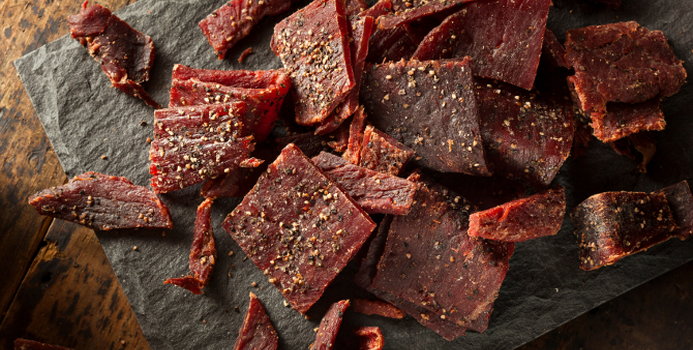While beef jerky is a convenient protein-rich snack when you're on the go, some brands of beef jerky aren't very heart-healthy. Pros and cons exist nutritionally for beef jerky, but opting for healthy varieties helps you meet daily nutrient needs without increasing your disease risks.
Calorie Content
One large 1-ounce piece of beef jerky contains about 116 calories, according to the U.S. Department of Agriculture (USDA) National Nutrient Database. However, lower-calorie varieties of beef jerky do exist. Some very lean, lower-sodium brands of beef jerky contain just 70 calories in each ounce.
Protein Perks
One benefit of beef jerky is that it's rich in high-quality complete protein and contains all essential amino acids. Therefore, low-fat beef jerky helps fill you up between meals, aids in muscle recovery after strenuous workouts, and can aid in healthy weight management. One ounce of beef jerky generally provides between 9 and 14 grams of protein, depending on the brand and quality of jerky you buy. Men need at least 56 grams of protein daily, and women should get a minimum of 46 grams per day -- which is the protein recommended dietary allowance (RDA).
Carbs and Fat
Beef jerky is a low-carb food, but fat content varies by brand. An ounce of beef jerky generally contains 2 to 3 grams of carbohydrates, which are mainly from sugars added during processing. The USDA reports that 1 ounce of beef jerky provides 7 grams of fat, but some healthier jerkys contain less than 1 gram of fat per ounce. Look for beef jerkies that are very lean and contain little fat, because the fat in meat is a source of saturated fat which can increase blood cholesterol.
Vitamins and Minerals
Just like regular beef, beef jerky is an excellent source essential vitamins and minerals. These include iron, zinc, phosphorous, and vitamin B-12. But unlike cooked beef, beef jerky is convenient, easy to take with you when you're on the go, and ideal for sack lunches.
What about Sodium?
The main drawback of beef jerky is its high sodium content. One ounce of regular beef jerky provides a whopping 590 milligrams of sodium, notes the USDA. The American Heart Association encourages Americans to limit dietary sodium intake to less than 1,500 milligrams daily, unless they lose large amounts of sodium by sweating, to reduce high blood pressure risks. Fortunately, lower-sodium beef jerky varieties do exist -- some containing just 140 milligrams of sodium per ounce.

An experienced health, nutrition and fitness writer, Erin Coleman is a registered and licensed dietitian and holds a dietetics degree from the University of Wisconsin-Madison. She also has worked as a clinical dietitian and health educator in outpatient settings. Erin's work is published on popular health websites, such as TheNest.com and JillianMichaels.com.



